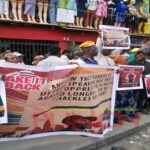ABUJA – Professor Pat Utomi says Nigerians are supporting him against a lawsuit from the Department of State Services (DSS). The DSS accuses him of trying to create an unconstitutional “shadow government.” The widespread shadow government defence support includes a large number of lawyers.
The DSS filed the suit on May 13 at the Federal High Court in Abuja. Senior Advocate of Nigeria Akinlolu Kehinde, for DSS, urged the court to declare Utomi’s alleged actions unconstitutional. The DSS claims these actions threaten Nigeria’s democratic structure.
Legal Community Rallies, Utomi Cites “Energising” Solidarity
Professor Utomi revealed on X (formerly Twitter) that “some want to put together 500 lawyers to defend me against the DSS.” He described this show of solidarity as “energising.” Reports indicate legal professionals, human rights advocates, and pro-democracy groups are mobilizing. They aim to ensure Utomi receives strong legal representation. These groups express concerns about shrinking civic space. They also worry about the misuse of national security agencies. This legal backing is a key part of the shadow government defence support.
Utomi has dismissed the DSS allegations. He called them a “shadowy business of chasing shadows of shadow cabinets.” He termed the lawsuit politically motivated. He said it indicates an increasingly authoritarian climate. Utomi warned that “the pursuit of patriotic alternatives must not be criminalised.”
Widespread Public Support and Civil Liberty Concerns
Professor Utomi expressed gratitude for the public support. “I am heartened by messages of solidarity from across Nigeria… Reminds me of the Nigeria I used to know. I want to thank all,” he stated. Civil society groups, student unions, and diaspora organisations have also publicly supported him. Some groups have called for peaceful demonstrations. These demonstrations would defend Utomi’s rights and democratic principles. The shadow government defence support extends beyond legal circles.
Human rights organisations have raised alarms. They describe increasing use of state institutions to stifle dissent. “This case against Pat Utomi may set a dangerous precedent for how the government treats political opposition,” said a spokesperson from the Socio-Economic Rights and Accountability Project (SERAP).
Understanding “Shadow Government” and Legal Opinions
The concept of a “shadow government” is central to the case. It is commonly used in parliamentary democracies. In Nigeria’s presidential system, the idea is largely informal. Shadow cabinets are typically formed by opposition figures to mirror government roles and propose alternative policies. They are not meant to usurp power.
Several constitutional lawyers have questioned the DSS’s interpretation. They doubt a shadow government is a threat to national security as claimed. “There is no provision in the Constitution that prohibits citizens from forming policy discussion groups or alternative platforms,” said Barrister Mary Oyelade, a Lagos-based constitutional expert. “The DSS should be careful not to conflate political pluralism with subversion.”
Analysts suggest the lawsuit could be a move to weaken opposition voices before the 2027 general elections. Utomi is linked to efforts to build a “third force” political coalition. The Presidency and the Ministry of Justice have not issued public statements on the lawsuit. This silence has fueled speculation. Many Nigerians are watching the judiciary’s handling of the case closely.
By Abdullah Korede








